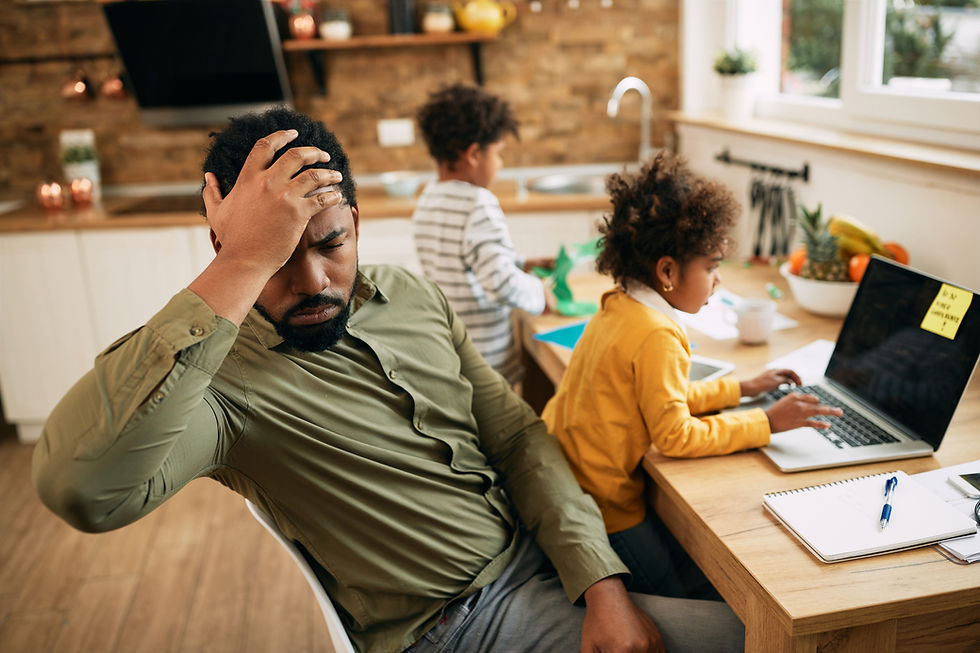Navigating the Emotional Terrain of FIFO Life: Strategies for Families
- Kimberly Freeman, BA.Psych, Dip.Couns, Registered Counsellor

- Jun 22, 2025
- 5 min read
Updated: Jul 13, 2025
Fly-in fly-out (FIFO) work arrangements are common across Australia’s mining, oil, and gas industries. While these roles often provide financial stability, they come with unique emotional and practical challenges for families—especially for the partners and children who stay at home.

As a counsellor specialising in grief, loss, and family transitions, and a FIFO partner for over 15 years, I’ve seen how FIFO life can affect family dynamics, communication, mental health, and parenting. In this post, I’ll share insights from recent peer-reviewed research about the real impacts of FIFO life on families, along with practical strategies to build connection, resilience, and wellbeing.
If you’re interested in the mental health aspect more generally, check out my post on Managing FIFO Stress and Mental Health
Understanding the Emotional and Psychological Impact of FIFO Life
One of the biggest challenges for FIFO families is coping with the ongoing separation and the cyclical “coming and going” associated with this work. Vojnovic and Bahn (2015) found that over one-third of FIFO workers reported symptoms of depression, anxiety, or stress that needed clinical attention.
This emotional strain does not stay confined to work; it spills over into family relationships and affects everyone involved. For at-home partners, managing the household and parenting alone can lead to fatigue, loneliness, and a sense of emotional disconnection. Gordon et al. (2018) describe many partners' experiences as “de facto single parenting,” with feelings of burnout and difficulty reconnecting when the FIFO worker returns.
The emotional load can often be hidden but remains very real, impacting both partners’ mental health and overall family wellbeing.
For more about how counselling can support FIFO families through these challenges, visit How Counselling Can Help FIFO Workers and Families
Parenting and Children in FIFO Families
Parenting in FIFO families comes with its own unique set of challenges. Research by Lester et al. (2015) studied the adolescent children of FIFO workers and found that consistent family routines, open communication, and structured family time were crucial for children’s emotional stability.
Families lacking consistent routines reported more behavioural problems and emotional withdrawal in children. Even when the FIFO parent is present, the emotional absence can linger, making transitions especially tough for young ones.
Kaczmarek (2008) found that although children in FIFO and similar family situations often demonstrate resilience, the emotional wellbeing of parents—particularly mothers—plays a pivotal role in how effectively the entire family copes.
If you want practical guidance on supporting children through FIFO cycles, take a look at my post on Family Support and Relationship Challenges in FIFO Life
Relationship Strain and the Challenge of Reconnection
Regular absences impose a need for FIFO couples to continually adjust roles and expectations. Gordon et al. (2018) found that “coming and going” disrupts daily routines and intimacy, leading to potential conflict or emotional distance.
Parker et al. (2018) also reported that transitions between work and home life can be marked by fatigue, role confusion, and mismatched expectations. FIFO workers may need rest, while partners often seek shared parenting support.
These stresses can put a strain on intimacy and connection, making open communication essential for successfully navigating these phases.
For a deeper dive into burnout and relationship balance in FIFO life, check out my post on The Hidden Costs of FIFO Life: Burnout and Balance
Isolation, Stigma, and Barriers to Support
FIFO workers and their partners often face social isolation, particularly in remote or rural locations. Parker et al. (2018) reported that stigma surrounding mental health can prevent workers from seeking help, fearing it may jeopardise their jobs or standing.
Partners can also feel isolated, with fewer opportunities for social connection or access to services.
Building awareness and normalising help-seeking behaviours are vital for overcoming these barriers and improving wellbeing.
Building Resilience: Practical Strategies for FIFO Families
Despite the numerous challenges, research indicates that many FIFO families build resilience by employing proactive strategies:
1. Establish Consistent Routines
Predictable routines provide security for children and families alike. Maintaining regular mealtimes, bedtimes, and family rituals during FIFO rotations can stabilize the home environment (Lester et al., 2015).
2. Use Visual Tools Like Countdown Calendars
Utilizing visual aids such as countdown calendars to help children track their parent's return can mitigate anxiety and foster a sense of control (Lester et al., 2015).
3. Maintain Meaningful Communication
Regular video calls or phone conversations focusing on emotional sharing—not just logistics—can help sustain connections during absences (Gordon et al., 2018).
4. Create Transition Rituals
Establish family traditions for welcoming the FIFO parent home or saying goodbye, such as shared meals or walks, to facilitate emotional adjustment (Gordon et al., 2018).
5. Support the At-Home Partner
Self-care and social support are crucial. Partners handling the household solo should prioritize connecting with friends, family, or counselling when necessary.
6. Seek Counselling When Needed
Confidential online counselling can be beneficial for both workers and families dealing with stress, grief, or relationship challenges. You can learn more about the services I offer here.
7. Review Roles and Expectations Regularly
Regular discussions about responsibilities can help prevent resentment and strengthen teamwork as family dynamics evolve (Parker et al., 2018).
8. Talk Openly with Children
Using age-appropriate language and creative outlets like journaling or drawing helps children process their feelings (Kaczmarek, 2008).
9. Financial Planning and Shared Goals
Clarifying family goals creates a shared purpose for the sacrifices made during FIFO life (Vojnovic & Bahn, 2015).
10. Advocate for Balanced Rosters
Whenever possible, engaging in discussions about roster adjustments with employers can relieve some family strain (Parker et al., 2018).
You Don’t Have to Navigate FIFO Life Alone
While FIFO life can provide financial benefits, it also brings significant emotional and relational challenges. By understanding these impacts and adopting evidence-based strategies, FIFO families can forge stronger connections and enhance resilience.
If you or your family are struggling, support is available. I offer tailored counselling services for FIFO families, including online sessions designed for your unique needs.
Together, we can help your family not just survive FIFO life, but truly thrive.
References
Gordon, L., & Trewin, D. (2018). Mental health and wellbeing concerns of FIFO workers and their partners in Australia: A qualitative study. BMJ Open, 8(3), e019516. https://doi.org/10.1136/bmjopen-2017-019516
Kaczmarek, E. (2008). The psychosocial well-being of children from Australian military and fly-in-fly-out (FIFO) mining families. Community, Work & Family, 11(3), 297–312. https://doi.org/10.1080/13668800802053668
Lester, L., Waters, S., Cross, D., & Douglas, T. (2015). Parenting adolescents: Developing strategies for FIFO parents. Journal of Child and Family Studies, 24(10), 3053–3066. https://doi.org/10.1007/s10826-015-0146-9
Parker, S. K., et al. (2018). Impact of FIFO work arrangements on the mental health and wellbeing of FIFO workers. Centre for Transformative Work Design, University of Western Australia.
Vojnovic, P., & Bahn, S. (2015). Depression, anxiety, and stress symptoms among Fly-In Fly-Out Australian resource industry workers. Journal of Health, Safety and Environment.

Kimberly Freeman
Bachelors of Psychology, Dip Counselling, Registered Counsellor, founder of Shifting Perspective Counselling, based on the Sunshine Coast, Australia. She offers compassionate, client-centred support for those navigating grief, loss, and life transitions both in person and online.





Comments